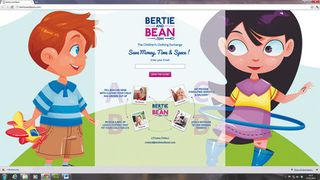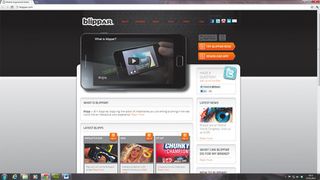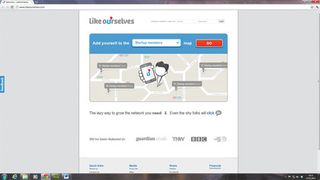11. Children's clothing exchange
Bertie and Bean

Bertie and Bean mirrors the success of websites like Freecycle, which let you donate unwanted items. This means people can get things for free that they would normally have to pay for, and usable items don't end up in landfill.
Let's face it - parents need all the help they can get when the little ones come along, and Bertie and Bean allows them to swap their baby's old clothes for newer items when they grow out of them - which, as we know, happens pretty darn quickly. It aims to save parents valuable time too, as they don't have to spend hours trawling the shops.
It's not totally free to use, but for a fee of £15 you'll receive a big bag of nearly new clothes (the contents of which you can tailor to a degree), which is a stark contrast to high street prices. You stand to save an absolute fortune this way - around £200 a year according to the website's founder James Tabor.
12. Hobby blogging platform
Hobzy

Hobzy is a small and relatively recent start-up developed to satisfy the needs of hobbyists in the UK. If you're a bit of an anorak or want to share a passion with like-minded people, this is the place for it.
It mixes Flickr's photo-sharing functionality with Tumblr's social blogging side. You create a profile, add your photo collection and any other details, and then either allow everyone to view it or choose to invite people to see what's going on. The greatest benefit will come from going public - your friends have probably seen it all anyway.
Get daily insight, inspiration and deals in your inbox
Sign up for breaking news, reviews, opinion, top tech deals, and more.
Despite being relatively new, Hobzy has a formidable following thanks to its straightforward interface, but it faces stiff competition from the many similar blogging platforms out there.
13. Universal shopping basket
Slingshot Shopping

Slingshot shopping is a small company run by friends Mitch Vidler and Stephen Darlington. It was created when its owners were frustrated by the time it took to buy a single item online.
The idea of Slingshot Shopping is to give you a universal shopping basket for the entire internet, enabling you to add anything while you surf. There's just one login and one checkout, even if you're buying from multiple sites.
The two founders are looking for retailers to support Slingshot Shopping, but the app will be made available to everyone later this year, so you'll be able to try it yourself. Mitch says the business was started as a bit of fun rather than to make money. It only opened its doors last summer and has yet to take off , but things are looking up.
14. Augmented reality
Blippar

Founded in summer 2011, Blippar showcases the possibilities of augmented reality. Newspapers, ads and all manner of products are brought to life - whether they're real, printed or on-screen.
Using Blippar's downloadable apps (available for Android and iOS), you simply point your phone's camera at an unassuming object and get a visual kick to go alongside it, like a downloadable recipe to go with a supermarket poster, or - and this is where it gets really cool - a watch or a pair of shoes that you can overlay onto your own body to see how they look.
There are all manner of uses for this technology, and the young company has picked up some serious clients including Virgin, Nestlé and Samsung.
15. Investment crowdsourcing
CrowdCube

Raising venture capital for a great business idea has never been easy - just look at some of the hapless 'contestants' on the BBC's Dragons' Den. Not everyone has the ability to articulate themselves well in front of potential investors, and that's exactly why recent start-up CrowdCube decided to set up shop - to put an end to that awkward first introduction by using crowdsourcing to hit funding targets.
The idea is that anyone - no matter how much money is in their wallet or what title they have before their name - can invest in a business they like the look of. It helps new business owners get their foot in the door, and allows ordinary people to gain equity in a business by simply clicking a couple of times on their PC. In the year since it launched, CrowdCube has raised over £2.3 million for new businesses and made £300,000 for itself.
16. Meet-up app
LikeOurselves

Whether you're a student looking for someone like-minded to share dissertation woes or just want get to know people in a new area, LikeOurselves lets you to meet without waiting awkwardly for someone to make the first move. When you want to meet you can 'Hi' someone (the equivalent of saying hello in person), and if they respond then you know they want to meet.
If you're not comfortable with meeting straight away, you can choose to meet at a later date or chat for a while to get acquainted. We reckon this service will either become hugely popular with those wanting to take Facebook or Foursquare to the next level, or it'll provide a great way for stalkers to make their next move.
17. Posh online takeaway
Housebites

The idea behind Housebites is such a simple, clever one, it's a wonder someone didn't come along sooner and pip it to the post.
When you can't be bothered to cook for yourself but you don't want the risk of ordering a dodgy takeaway from a local kebab house, you can get a chef in your area to prepare a meal specifically for you and have it delivered to your door. Just type in your postcode and you'll be presented with a list of local chefs, along with their specialities and what they're cooking at any one time. Then you can just order something and it'll be delivered to your home.
The selling point with Housebites is that you get the convenience of a takeaway service combined with the quality of a restaurant, and you can do it all from the comfort of your sofa and PC.
18. Office cloud collaboration
OneDrum

Collaborative working - editing a single document with several other people at once - is nothing new, but OneDrum, a start-up launched in early 2011, takes things to the next level.
Not only does it allow you to collaborate with others on Word, Excel and PowerPoint documents, it lets you do so in real time - unlike Office Web Apps, where collaboration is limited to seeing changes after they've been made and saved.
It needs to be installed on all the PCs being used, but once that's done it's easy to see who you're sharing with, and who's editing what.
19. Twitter scheduler
Buffer

If you're a prolific tweeter, you might appreciate Buffer. It lets you schedule your daily Tweets - or weekly, for that matter - so you can target your followers with information when it's most effective (when they're all online), rather than as a single spammy job-lot when it suits you. By drip-feeding tweets, you'll be able to target a much bigger audience, resulting in greater engagement with your feed.That said, there's no replacement for a bit of spontaneity and personality on your feed, so this app is really only intended for grunt work. Buffer just goes to show that, while a market might seem oversaturated to the point of melting, there's still room for niche ideas to flourish.
20. Social networking
Bantr

The best way of describing Bantr is that - apart from being a hangout for football fans - it's a scaled down version of Zeebox, offering fans the ability to chat (or hurl abuse at each other, whatever you want to call it) about a match as it's been watched. This is something you could do with a football-focused Twitter feed, but Bantr offers a lot more.
There's fantasy football, for example which lets its 10,000-odd users rate their respective managers and players. If you correctly predict the outcome of matches you can earn points, which boost your popularity in the network's league.
At present Bantr lacks any sort of monetisation, but founder Peter McCormack has plans for partners and an online shop offering discounts to high-ranking members.












